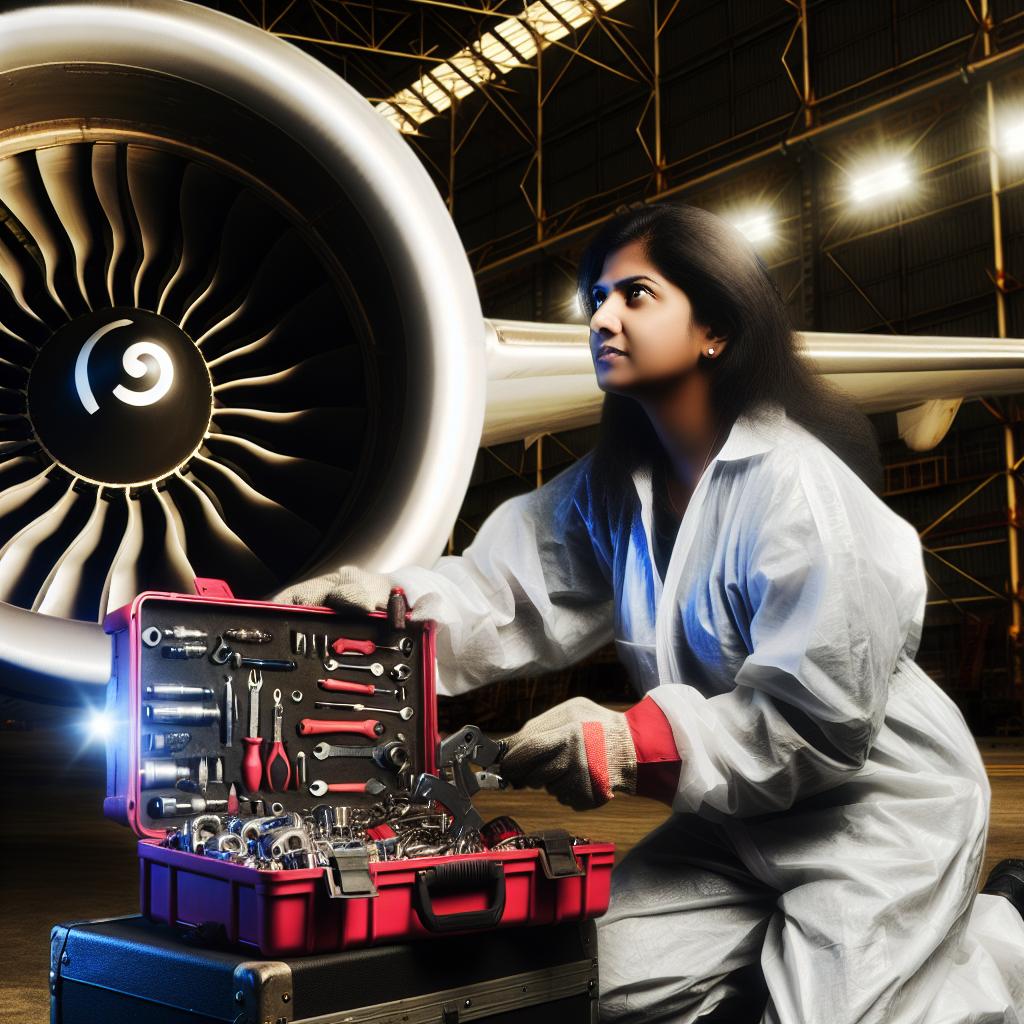Understanding Aircraft Systems and Components
Fundamentals of Aircraft Systems
Aviation maintenance technicians must grasp the basics of aircraft systems.
These systems include avionics, hydraulics, and propulsion.
An understanding of how these systems interact is crucial.
This knowledge helps technicians diagnose issues effectively.
Overview of Major Components
Aircraft consist of several key components.
Wings play a vital role in lift generation.
The fuselage houses passengers and cargo safely.
Engines provide the necessary thrust for flight.
Understanding each component’s function is imperative for maintenance.
Importance of Electrical Systems
Electrical systems power critical aircraft functions.
They control navigation, communication, and various onboard systems.
Technicians must be familiar with electrical schematics.
Knowledge of troubleshooting techniques is essential.
Hydraulic System Functionality
Hydraulic systems operate landing gear and control surfaces.
These systems rely on pressurized fluid for movement.
A deep understanding aids in ensuring system reliability.
Regular inspections help prevent hydraulic failures.
Avionics Knowledge
Avionics systems encompass communication and navigation tools.
Familiarity with these systems enhances flight safety.
Technicians should stay updated on emerging technologies.
A strong foundation in avionics contributes to successful inspections.
Regulatory Compliance
Understanding regulations is essential for aviation maintenance.
Technicians must adhere to FAA guidelines and standards.
Proper documentation ensures compliance and safety.
Regular training keeps technicians informed about updates.
Unlock Your Career Potential
Visualize a clear path to success with our tailored Career Consulting service. Personalized insights in just 1-3 days.
Get StartedImportance of Technical Proficiency in Maintenance Tools
Understanding Technical Proficiency
Technical proficiency is vital for aviation maintenance technicians.
It ensures safety and reliability in aircraft operations.
Technicians must be familiar with various maintenance tools.
This familiarity enhances efficiency and effectiveness in repairs.
Key Maintenance Tools
A variety of tools are essential for effective maintenance work.
Common tools include wrenches, screwdrivers, and pliers.
Additionally, specialized instruments like torque wrenches are crucial.
Technicians also rely on diagnostic equipment for troubleshooting.
Benefits of Tool Proficiency
Proficiency in using maintenance tools leads to greater accuracy.
It reduces the risk of damage during repairs.
Furthermore, skilled technicians complete tasks more quickly.
This efficiency can significantly reduce overall maintenance time.
Training and Development
Continuous training is necessary for maintaining tool proficiency.
Workshops and hands-on training enhance practical skills.
Online courses provide valuable theoretical knowledge.
Technicians should stay updated with new tools and technologies.
Role of Technical Proficiency in Aviation Maintenance
In summary, technical proficiency is essential in aviation maintenance.
It plays a crucial role in ensuring the safety and reliability of aircraft.
Technicians must continually enhance their skills and knowledge.
This dedication to proficiency benefits the aviation industry.
Troubleshooting and Problem-Solving Skills
Importance of Troubleshooting
Troubleshooting is a critical skill for aviation maintenance technicians.
Identifying issues quickly can prevent further damage.
Moreover, it increases safety for all aircraft users.
Technicians must stay calm under pressure.
This ability allows them to focus on resolving problems efficiently.
Steps in Effective Troubleshooting
Effective troubleshooting involves a systematic approach.
Technicians should begin by gathering relevant information.
Next, they can formulate possible solutions based on their findings.
Then, they should test these solutions one at a time.
This process helps ensure thorough problem resolution.
Critical Thinking and Analysis
Critical thinking is essential in aviation maintenance.
Technicians must analyze data to pinpoint issues accurately.
They should evaluate potential causes and implications.
Furthermore, strong analytical skills lead to better decision-making.
Technicians often rely on their intuition paired with experience.
Communication Skills
Effective communication enhances troubleshooting efforts.
Technicians must convey issues clearly to their teams.
Moreover, they should listen actively to input from colleagues.
Understanding different perspectives aids in problem-solving.
This collaboration often leads to quicker resolutions.
Adapting to New Technologies
Technology in aviation is constantly evolving.
Technicians must adapt their troubleshooting skills accordingly.
Being familiar with the latest tools is beneficial.
Additionally, training in new software can enhance efficiency.
Technicians should remain current with industry developments.
See Related Content: How to Excel as an Aviation Maintenance Technician
Knowledge of Safety Regulations and Procedures
Understanding Safety Regulations
Aviation maintenance technicians must understand various safety regulations.
These regulations ensure safe aircraft operation and maintenance practices.
Technicians should be familiar with FAA regulations and guidelines.
Compliance with these regulations is crucial for effective safety management.
Moreover, knowledge of international regulations enhances global aviation safety.
Implementing Safety Procedures
Implementing safety procedures is vital in day-to-day operations.
Technicians must follow procedures to minimize workplace hazards.
This includes using personal protective equipment (PPE) effectively.
Regular safety training sessions keep technicians informed about best practices.
Additionally, audits and inspections help maintain safety standards.
Reporting Safety Incidents
Reporting safety incidents promptly is essential in aviation maintenance.
Technicians should always document any safety-related occurrences.
This practice allows for thorough investigations and future prevention.
Moreover, clear communication enhances teamwork and safety awareness.
Maintaining open lines of communication supports a safety-conscious culture.
Continuous Education and Training
Continuous education is necessary for aviation maintenance technicians.
Staying updated on new regulations and technologies is vital.
Regular training improves skills and knowledge about safety practices.
Workshops and seminars provide hands-on experience with safety tools.
Cultivating a learning environment promotes safety awareness among staff.
Delve into the Subject: How to Land Your First Job in Supply Chain Management
Effective Communication Skills within a Team
Importance of Clear Communication
Clear communication is vital for aviation maintenance technicians.
It ensures that all team members understand their roles.
Furthermore, clarity minimizes the risk of errors during maintenance tasks.
Technicians often work in high-pressure environments.
Effective communication helps mitigate misunderstandings in these situations.
Team Collaboration and Interaction
Collaboration fosters a supportive work environment.
Team members should actively share information with each other.
Regular team meetings enhance collaboration within the group.
Additionally, open dialogues can address concerns before they escalate.
Encouraging feedback among peers fosters a culture of continuous improvement.
Utilizing Communication Tools
Modern technology offers various communication tools for teams.
Email, messaging apps, and project management tools streamline communication.
These tools enhance efficiency and keep everyone on the same page.
Teams must select the most suitable tools for their specific needs.
Effective use of technology can simplify information sharing significantly.
Building Trust through Communication
Trust is integral to effective teamwork in aviation maintenance.
Consistent and honest communication helps build this trust.
Team members should feel comfortable expressing their thoughts and concerns.
This open communication leads to greater team cohesion.
Ultimately, trust enhances job satisfaction and team productivity.
Gain More Insights: How to Optimize Fleet Operations for Canadian Managers

Attention to Detail in Inspections and Repairs
Importance of Precision
Aviation maintenance technicians must exhibit extraordinary precision in their work.
Each detail affects the overall safety of aircraft operations.
Neglecting minor issues can lead to significant safety risks.
Thus, technicians must ensure that inspections are thorough and meticulous.
Inspection Procedures
Follow established protocols for conducting inspections.
Each step should be executed systematically to avoid oversights.
Additionally, technicians should utilize checklists to enhance focus.
Checklists assist in confirming that no steps are skipped during inspections.
Repair Techniques
Precision is equally critical in repair methods.
Use appropriate tools and follow manufacturer specifications during repairs.
Taking shortcuts can compromise the integrity of repairs.
Each repair should be tested to ensure it meets safety standards.
Documentation and Communication
Thorough documentation is essential in aviation maintenance.
Clearly record all findings during inspections and repairs.
This documentation aids in tracking the maintenance history of aircraft.
Moreover, effective communication among team members is vital.
Share observations and any concerns to ensure collective understanding.
Continuous Training and Improvement
Staying updated on aviation technology enhances attention to detail.
Participate in regular training sessions to refine skills.
Furthermore, learning from past mistakes can improve performance.
A commitment to continuous improvement fosters a culture of safety.
Explore Further: Qualities That Make a Great Aviation Maintenance Technician
Time Management and Organizational Skills
The Importance of Time Management
Time management is crucial for aviation maintenance technicians.
Effective time management improves efficiency and productivity.
Additionally, it reduces stress and enhances job performance.
Consequently, technicians can meet critical deadlines.
Organizational Skills in the Workplace
Organizational skills streamline maintenance tasks.
Such skills help prioritize responsibilities effectively.
Moreover, they aid in keeping track of parts and tools.
This organization prevents costly delays during repairs.
Implementing Time Management Strategies
Begin by setting clear goals and deadlines.
Utilize planners or digital calendars for task scheduling.
Furthermore, break larger projects into manageable steps.
This approach enhances focus and direction for technicians.
Tips for Enhancing Organizational Skills
Maintain a tidy and organized workspace.
This practice allows easy access to tools and materials.
Also, develop a consistent inventory system for parts.
Such systems prevent shortages during critical projects.
Balancing Tasks Effectively
Balance various projects by assessing urgency and importance.
Regularly review ongoing tasks to reallocate resources as needed.
Additionally, use checklists to monitor task completion.
These methods help maintain productivity throughout the day.
Continuous Learning and Adaptability to Technological Advances
The Importance of Continuous Learning
Continuous learning is vital for aviation maintenance technicians.
The aviation industry evolves rapidly due to technological advancements.
Technicians must adapt to maintain safety and efficiency.
Regular training helps technicians with new systems and equipment.
In-house training programs can refresh existing knowledge.
Additionally, external workshops offer additional insights and skills.
Joining professional organizations can provide networking opportunities.
Networking encourages sharing best practices among peers.
Technicians should stay informed about industry updates regularly.
Embracing New Technologies
New technologies change the landscape of aviation maintenance.
From digital tools to advanced diagnostic systems, technicians face challenges.
Understanding these technologies enhances problem-solving capabilities.
Regular workshops on emerging technologies are essential.
For instance, learning about aircraft maintenance software increases efficiency.
Moreover, exploring drone technology may become increasingly relevant.
Technicians can benefit from manufacturers’ training on innovative equipment.
Developing Adaptability Skills
Adaptability is crucial for effective problem-solving in aviation maintenance.
Technicians encounter unexpected issues that require quick thinking.
Adaptable technicians are better positioned to find innovative solutions.
They thrive in fast-paced environments and respond positively to changes.
Practice in real-world scenarios helps foster this adaptability.
Case studies can illustrate successful adaptations to past challenges.
Moreover, fostering a positive attitude toward change encourages growth.
The Role of Soft Skills
In addition to technical skills, soft skills are vital in this field.
Communication is key for effective teamwork and troubleshooting.
Technicians must clearly articulate issues and solutions to colleagues.
Furthermore, strong interpersonal skills enhance workplace collaboration.
Time management also plays an important role in aviation maintenance.
Technicians must prioritize tasks and manage their workloads effectively.
Leveraging Online Learning Platforms
Online learning platforms have made continuous education more accessible.
Technicians can choose courses that fit their specific needs anytime.
These platforms often provide up-to-date material on new technologies.
Interactive courses can improve engagement and retention of knowledge.
Moreover, web seminars offer insights from industry experts.
Certifications from these courses can enhance a technician’s credentials.
Technicians should actively seek out relevant online opportunities.




